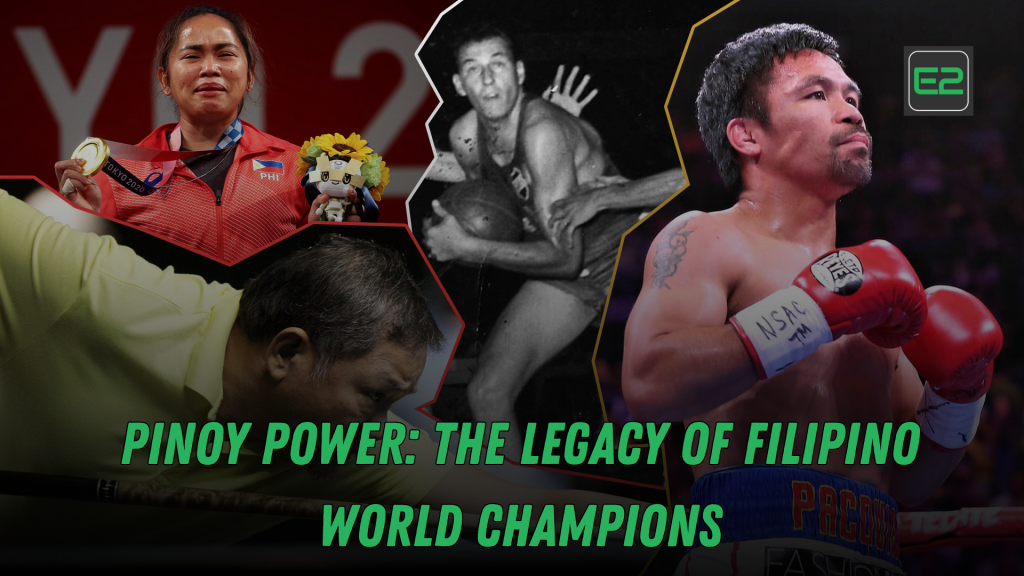Table of Contents
PINOY POWER: Champions Born from Grit and Glory
The Philippines has long been a breeding ground for warriors, not just in spirit, but in sport. Across boxing rings, billiards halls, weightlifting platforms, and even esports arenas, Filipino world champions have consistently punched above their weight. This isn’t just about medals and titles — it’s about national pride, resilience, and global recognition.
In this article, we explore the legacy of Filipino world champions, how they shaped national identity, and why “Pinoy Power” continues to inspire generations around the globe.
Manny Pacquiao: The Gold Standard of Filipino Greatness (Pinoy Power)
No discussion about Filipino champions is complete without Manny “Pacman” Pacquiao, arguably the most iconic athlete in the country’s history.
Why Manny Pacquiao is a Global Icon:
- Only boxer to win world titles in 8 weight divisions
- Former WBC, WBO, and IBF titleholder
- Revered not just for speed and power, but humility and patriotism
Pacquiao’s rise from poverty in General Santos City to global superstardom is the ultimate rags-to-riches story. His career gave birth to the term “Pinoy Pride” and helped spotlight Filipino excellence in global sports.
The Next Generation of Boxing Champions
After Pacquiao, a new breed of Filipino boxers has carried the torch, proving that the Philippines remains a boxing powerhouse.
Notable Names:
- Nonito Donaire (“The Filipino Flash”) – Multiple-time world champion, known for speed and precision
- Jerwin Ancajas – Former IBF Super Flyweight champion
- John Riel Casimero – Former WBO Bantamweight champ, known for knockout power
- Marlon Tapales – Unified super bantamweight world champion as of 2023
These champions continue to elevate Pinoy boxing on the global stage, mixing traditional toughness with modern technique.

Beyond the Ring: Champions in Other Arenas
1. Hidilyn Diaz – Olympic Weightlifting Hero (Pinoy Power)
In 2021, Hidilyn Diaz made history as the first Filipino to win an Olympic gold medal. Her victory in women’s weightlifting at the Tokyo Olympics ended a 97-year gold medal drought for the Philippines.
Legacy Highlights:
- Role model for female athletes
- Promoter of strength sports in Southeast Asia
- Proof that world-class athletes can emerge from modest beginnings

2. Efren “Bata” Reyes – The Magician of Billiards (Pinoy Power)
In the world of pool, Efren Reyes is a living legend.
Career Achievements:
- Over 100 international titles
- 1999 WPA World 9-Ball Champion
- Known for creative shot-making and humble demeanor
Reyes proved that intellect and finesse, not just brute force, could bring home glory. His legacy inspired a generation of Filipino billiards players, and he remains one of the sport’s most respected figures globally.

3. Alex Eala – Rising Star in Tennis (Pinoy Power)
At just 18, Alex Eala is making waves in the international tennis scene. With junior Grand Slam titles and rising WTA rankings, she represents the future of Filipino tennis.
Why Alex Eala Matters:
- Youngest Filipino to win a junior Grand Slam (US Open Girls’ Doubles)
- Trained at Rafa Nadal Academy
- Signifies the emergence of female Filipino athletes in global sports

4. Team Sibol – Championing Esports Glory (Pinoy Power)
Filipinos are now world champions in esports too. Team Sibol, the Philippine national esports team, brought home gold medals in regional and global competitions in games like Mobile Legends, Dota 2, and Wild Rift.
Why This Matters:
- Esports offers new platforms for Filipino talent
- Breaks traditional barriers (age, physical size)
- Builds community among young Filipinos globally

Cultural Impact: Why Filipino World Champions Matter
1. National Identity and Unity
Every victory on the global stage becomes a moment of national celebration. Champions remind Filipinos of their collective strength and perseverance.
2. Inspiration for the Next Generation
Stories of champions from humble beginnings motivate young athletes in barangays, gyms, and schools across the archipelago.
3. Global Representation
Filipino athletes showcase not just talent, but the values of resilience, humility, and faith. They break stereotypes and build respect for Filipino identity worldwide.
Challenges Faced by Filipino Athletes
Despite their success, many champions face systemic challenges:
- Lack of funding and training facilities
- Limited exposure to international competition
- Inconsistent support from sports governing bodies
Overcoming these obstacles makes their victories even more significant — and underscores the need for better infrastructure and investment in Philippine sports.
The Role of Media and Social Platforms
The rise of social media has enabled Filipino world champions to connect with global audiences, build personal brands, and advocate for social causes. Platforms like YouTube, Instagram, and TikTok also allow fans to follow training routines, behind-the-scenes stories, and advocacy work.
A Legacy That Keeps Growing
From the fierce punches of Pacquiao to the elegant strokes of Eala, Filipino world champions continue to define and redefine what it means to represent the Philippines. These athletes are more than medalists — they are symbols of hope, excellence, and national pride.
“Pinoy Power” isn’t just a slogan. It’s a movement — and it’s far from over.
Share the Pride
Which Filipino champion inspires you the most? Drop their name and why in the comments below!
Share this article to celebrate Filipino excellence and Pinoy Power with the world.
Subscribe for more stories about Pinoy greatness in sports, arts, and beyond.
